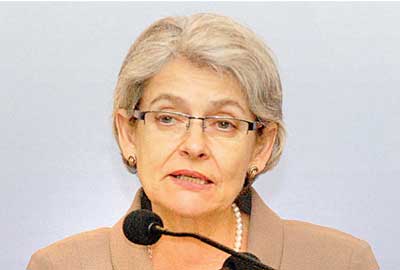Thursday Feb 19, 2026
Thursday Feb 19, 2026
Wednesday, 17 August 2016 00:01 - - {{hitsCtrl.values.hits}}
 By Charnika Imbulana
By Charnika Imbulana
UNESCO Director-General Irina Bokova yesterday outlined the economic importance of education in a speech on the topic ‘Soft Power for Peace and Development - UNESCO and the Sustainable Development Goals’, delivered at the Lakshman Kadirgamar Institute of International Relations and Strategic Studies.
“The evidence is overwhelming. UNESCO’s forthcoming Global Education Monitoring Report shows that on average every additional year of education boosts a person’s income by 10 % and increases a country’s GDP,” said Bokova, who is currently on her first official visit to Sri Lanka and was speaking at the institute on the invitation of Foreign Affairs Minister Mangala Samaraweera.
“Education is a human right, essential to dignity and empowerment. It is a multiplier for more inclusive and sustainable development. In advancing gender equality, poverty eradication, sustainability it is a force for peace. Whether in Tokyo or Nairobi or New York, educating a child is the smartest investment a society can make in its future in lasting peace.”
“Working with member state partners, UNESCO is leading forward the education 2030 framework for action. UNESCO has long worked with the Government of Sri Lanka to bolster its efforts to ensure quality education for all, to train teachers, to deepen innovation in vocational and professional training. Sri Lanka has a success story to tell when we speak about literacy and education. What we need now to move on, is about the quality. This is where the South Asian Centre for Teacher Development, a UNESCO Category 2 centre, comes to the forefront. We do believe teachers hold the key to the quality of education,” she asserted.
She went on to state that empowering girls and women must be a special priority and revealed that Sri Lanka was participating in UNESCO’s project to empower girls and institute equality education.
“The IMF estimates that if women participated in the labour market to the same extent as men, GDP could increase by 5% in the United States, by 9% In Japan and by 27% in India. Being born a girl remains a primary cause for exclusion today. Too many girls are still forced to work, married off, taken from school. The figures are staggering. Only 60% of countries have achieved parity in primary education and only 38% in secondary. Sixty-two million girls are denied the right to a basic education. This throws a shadow over all development,” she revealed.
“We must change this situation. The good news is that we can, by focusing on access, on the quality of education, on the transition to secondary education, on the conditions of learning and on teacher training,” she emphasised. “These goals guide our UNESCO actions in moving forward with the 2030 agenda.”
The UNESCO Director-General paid a glowing tribute to former Foreign Minister, the late Lakshman Kadirgamar, describing him as a great statesman and politician, a man of intellect, a man renowned for his wit and a great humanist committed to peace and UNESCO.
She recalled how he often cited lines from the UNESCO Constitution. She also remembered the late Foreign Minister’s passionate appeals for the unity of humanity at the UN General Assembly.
“His legacy lives on not only in Sri Lanka but across the world,” she said.